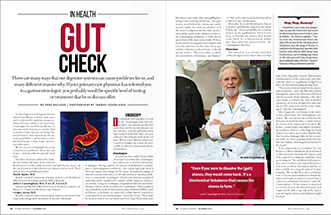 Kudos to John T. Cunningham, MD, FACP, FASGE, a University of Arizona professor of medicine in the Division of Gastroenterology and the Samuel and Winnifred “Quiggy” Witt Endowed Chair in Medicine, who is featured in a Tucson Lifestyle “In Health” article in the magazine’s November issue.
Kudos to John T. Cunningham, MD, FACP, FASGE, a University of Arizona professor of medicine in the Division of Gastroenterology and the Samuel and Winnifred “Quiggy” Witt Endowed Chair in Medicine, who is featured in a Tucson Lifestyle “In Health” article in the magazine’s November issue.
Entitled “Gut Check,” the article—by Associate Editor Anne Kellogg—looks at the many ways our digestive systems can cause problems for us, touching on issues related to the esophagus, stomach, gall bladder and pancreas.
 Click here or on the image at left to view the article.
Click here or on the image at left to view the article.
Among the things Dr. Cunningham brings up are various causes of pancreatitis—inflammation of the pancreas, pointing to endoscopic ultrasound imaging as a way to diagnose the problem.
“We can put a scope down into the first part of the small intestine—that’s where the head of the pancreas is located. We bounce sound waves through to visualize the problem. If there’s a blockage, we’ll pull down a second scope to try to find the bile duct to put a drainage tube in, like a stent. Actually, we were putting stents into the bile duct before cardiologists had stents for the heart,” he says.
Dr. Cunningham was the lead doctor on a multidisciplinary UA team of physicians that got Banner – University Medical Center Tucson accredited as an NPF Treatment Referral Center by the National Pancreas Foundation last fall (see link to article on that below).
The article also discusses hepatitis C, colon cancer screening, diarrhea diagnoses, irritable bowel syndrome, inflammatory bowel disease along with procedures involving endoscopy, colonoscopy, CT scans and gastrocameras, or colonic camera pills (a tiny camera in a capsule that’s swallowed).
Dr. Cunningham and other GI specialists interviewed for the article note better diets often are a key element in avoiding digestive ailments. A food journal helps patients self-identify some potential items to avoid (see other tips in the sidebar “Notes from a Nutritionist”). 
Always refer to a specialist when loose bowels, pain or other issues persist.
One thing they all agree on is that processed foods containing high-fructose corn syrup lie at the root of the U.S. obesity epidemic and, as a result, fatty liver is likely to become the top reason for end-stage liver disease. Look for more research on that topic to come.
ALSO SEE:
"UA Medical Team Wins Accreditation for Banner – UMC Tucson as Treatment Referral Center by National Pancreas Foundation" | Posted: Sept. 8, 2015

